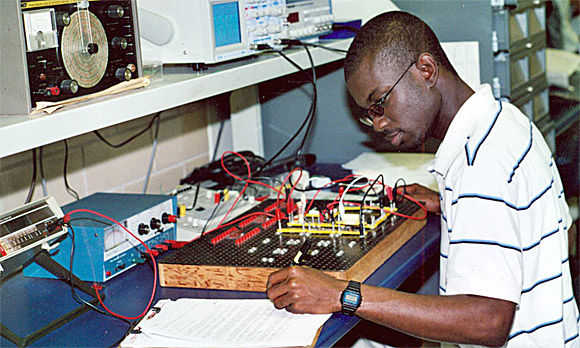Electronics Engineering Technology
Explore the role of conductors, circuits, and systems in the building structures and programming devices.

learn the intricacies of electronics
Electronic engineering technology graduates have the knowledge and skills required to design, troubleshoot and repair computers, communications equipment, medical monitoring devices, navigational equipment, and other electrical and electronic equipment.

FVSU’s Bachelor of Science Degree major in electronic engineering technology is the only one of its kind available in middle Georgia. Students explore the role of conductors, circuits and systems in building structures and programming devices.
The program features small class sizes in its technical courses. This provides students with the opportunity to receive individualized attention in their training. State-of-the-art laboratories, facilities and equipment provide relevant and practical experience for students in the program.
The Electronic Engineering Technology Program is accredited by the Engineering Technology Accreditation Commission of ABET, https://www.abet.org, under the commission’s General Criteria and Program Criteria for Electrical/Electronic(s) Engineering Technology and Similarly Named Programs.
DEGREE OFFERED
Bachelor of Science with a major in electronic engineering technology
CAREER OPPORTUNITIES
- Application Engineer/Technologist
- Field Service Engineer
- High School Engineering and Technology Educator
- Manufacturing Engineer
- Plant Operation Engineer/Technologist
- Production Design Engineer/Technologist
- Sales Engineer
- Telecommunication Technologist
- Test Engineer
PROGRAM EDUCATIONAL OBJECTIVES
Electronic Engineering Technology Program Educational Objectives:
The EET faculty has established the Program Educational Objectives for the Bachelor of Science in Electronic Engineering Technology at FVSU, and they are given below. Graduates are prepared to be practicing Electronic Engineering Technologists with the following attributes:
- possess adequate technical knowledge in their discipline;
- have problem-solving skills necessary to succeed as engineering technologies;
- have a well-rounded general education background;
- have good oral and written communication skills;
- have adequate knowledge of professional ethics;
- have the ability for life-long learning; and
- have a good awareness of contemporary global issues and a commitment to continuous improvement
Electronic Engineering Technology Student Outcomes:
In order to achieve the EET Program Educational Objectives, the EET faculty has established the Student Outcomes for the Bachelor of Science in Electronic Engineering Technology at FVSU, and they are given below. Students at the time of graduation will have:
- an ability to apply knowledge, techniques, skills and modern tools of mathematics, science, engineering, and technology to solve broadly-defined engineering problems appropriate to the discipline;
- an ability to design systems, components, or processes meeting specified needs for broadly-defined engineering problems appropriate to the discipline;
- an ability to apply written, oral, and graphical communication in broadly-defined technical and non-technical environments; and an ability to identify and use appropriate technical literature;
- an ability to conduct standard tests, measurements, and experiments and to analyze and interpret the results to improve processes; and
- an ability to function effectively as a member as well as a leader on technical teams.
- Understand and aware of Engineering code of ethics.
- an ability to use modern software tools for circuit analysis and report writing.
Enrollment and Graduation Numbers
| Academic Year | 2018-2019 | 2019-2020 | 2020-2021 | 2021-2022 | 2022-2023 | 2023-2024 |
|---|---|---|---|---|---|---|
| Enrollment | 85 | 75 | 82 | 99 | 80 | 79 |
| Graduates | 6 | 7 | 6 | 7 | 12 | 7 |
Meet the Faculty
The Engineering Technology Department faculty at Fort Valley State University understand what it takes to succeed.
Electronic Engineering